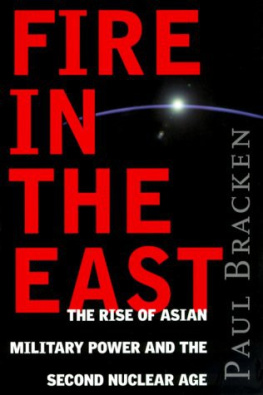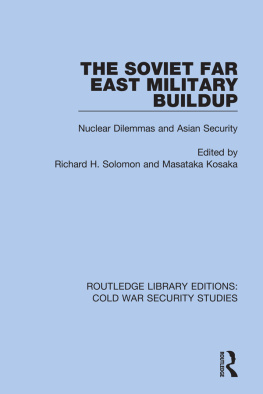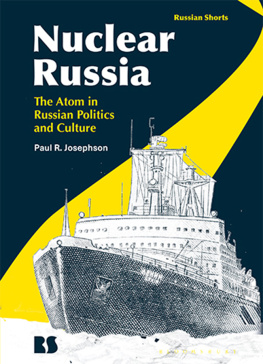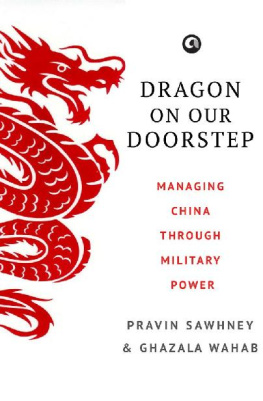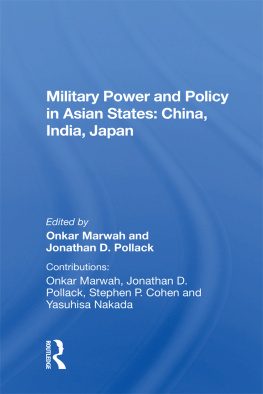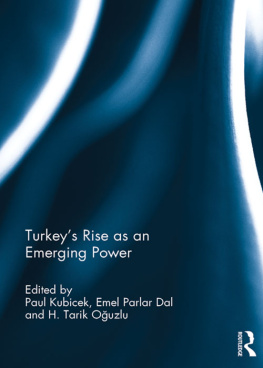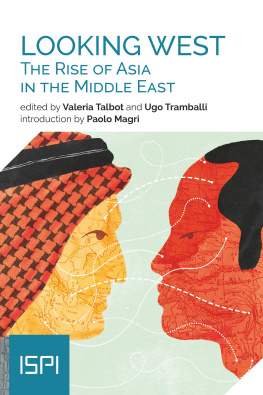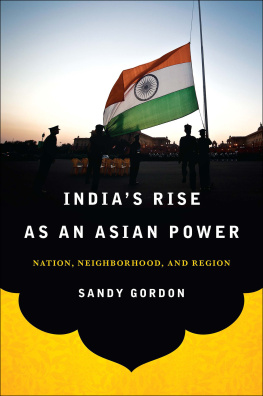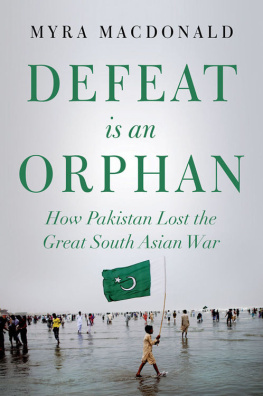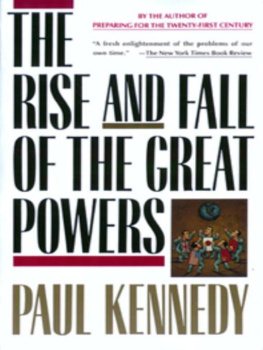Paul Bracken - Fire in the East: The Rise of Asian Military Power and the Second Nuclear Age
Here you can read online Paul Bracken - Fire in the East: The Rise of Asian Military Power and the Second Nuclear Age full text of the book (entire story) in english for free. Download pdf and epub, get meaning, cover and reviews about this ebook. year: 1999, publisher: Harper, genre: Politics. Description of the work, (preface) as well as reviews are available. Best literature library LitArk.com created for fans of good reading and offers a wide selection of genres:
Romance novel
Science fiction
Adventure
Detective
Science
History
Home and family
Prose
Art
Politics
Computer
Non-fiction
Religion
Business
Children
Humor
Choose a favorite category and find really read worthwhile books. Enjoy immersion in the world of imagination, feel the emotions of the characters or learn something new for yourself, make an fascinating discovery.
- Book:Fire in the East: The Rise of Asian Military Power and the Second Nuclear Age
- Author:
- Publisher:Harper
- Genre:
- Year:1999
- Rating:5 / 5
- Favourites:Add to favourites
- Your mark:
- 100
- 1
- 2
- 3
- 4
- 5
Fire in the East: The Rise of Asian Military Power and the Second Nuclear Age: summary, description and annotation
We offer to read an annotation, description, summary or preface (depends on what the author of the book "Fire in the East: The Rise of Asian Military Power and the Second Nuclear Age" wrote himself). If you haven't found the necessary information about the book — write in the comments, we will try to find it.
Paul Bracken: author's other books
Who wrote Fire in the East: The Rise of Asian Military Power and the Second Nuclear Age? Find out the surname, the name of the author of the book and a list of all author's works by series.
Fire in the East: The Rise of Asian Military Power and the Second Nuclear Age — read online for free the complete book (whole text) full work
Below is the text of the book, divided by pages. System saving the place of the last page read, allows you to conveniently read the book "Fire in the East: The Rise of Asian Military Power and the Second Nuclear Age" online for free, without having to search again every time where you left off. Put a bookmark, and you can go to the page where you finished reading at any time.
Font size:
Interval:
Bookmark:
FIRE
IN
THE
EAST
THE RISE OF ASIAN
MILITARY POWER AND
THE SECOND NUCLEAR AGE
PAUL BRACKEN

For Kathleen, James, and Meg
F or two hundred years the world has been shaped by the fact of Western military dominance. Gunboats as agents of national power have been supplanted by warplanes, and they in turn by missiles and satellites and computers, but until very recently all were a monopoly of Europeans and North Americans. Now that monopoly is coming to an end. Missiles carrying atomic and biological warheads will, within the decade, be within the reach of as many as twelve Asian nations, from Israel to North Korea. The world the West has knownconstructed, in part, for its own conveniencewill change enormously. Whether the change will also be catastrophic is the subject of this book.
The Wests military dominance has held for so long that it is taken for granted, the unnoticed backdrop to international affairs. No one even thinks about a world without it. But a world of new military powers is appearing right before our eyes. Iran fires longrange missiles and is very likely to test a nuclear weapon in the next few years. North Korea, already believed to have a few atomic bombs, shoots a missile over Japanese cities with a range that could strike U.S. territory. India and Pakistan are building serious nuclearforcesnot experimental devices for status, but weapons akin to what the United States and the Soviet Union had in the 1950s. Washington and its allies used every tool of diplomacy to stop their atomic tests in 1998. Their answer, essentially, was that countries with atom bombs dont have to listen to anyone else.
Asias new military might was already a major factor in international politics. After confrontations with China over human rights and trade in the early 1990s, the United States reversed course following Chinese missile tests near Taiwan in 1995 and 1996. Washington showered attention on Beijing, giving its leaders a twenty-one-gun salute and overlooking continued violations in human rights and the sale of missile parts to Iran and Pakistan. What happened to make the United States change its mind? Officials explained that engagement with China was better than containment. This is true. But the reason for the diplomatic shift was military power. The widespread sense that China will be a major military power makes an arrangement with it an American necessity. The United States was not as concerned about engagement with China in 1965, when its armed forces consisted of 5 million peasants with rifles and two atomic bombs.
India drew this same conclusion. It was the major reason behind its nuclear breakout in 1998. India saw the Chinese-American partnership working against it. Delhi correctly foresaw that the Western economic sanctions imposed following the tests wouldnt last long because, after all, it was better to engage India than to contain it. Iran is drawing this lesson as well, building up long-range missiles and atomic bombs while making diplomatic overtures to the West. Will Washington elect to contain Tehranor to engage it?
Atomic bombs on missiles get the Wests attention. If the country is big and powerful, it earns Western engagement. First come the international Ping-Pong games or wrestling matches, building goodwill through sports. Next, foreign investment is encouraged. Technology is released for sale, and before long supercomputerswhich can be used to design nuclear warheadsare on their way.
But criticizing Western policy isnt the point of this book. Engagement may be the only sensible diplomatic solution for dealing with countries with nuclear weapons and missiles. Criticizing that policy is like spitting into the wind. The problem is that the United States isnt thinking about what it will be like to live in a world where five to ten Asian countries are nuclear powers, with missiles that can hit distant targets. Instead, its focused on keeping this from happening, despite evidence that the policies that have worked for the last twenty-five years are rapidly losing effectiveness. Proliferation of modern weaponry is driven not by anything that happens in Washington, but by the national strategies set in Beijing, Delhi, and Tehran. The spread of these technologies will continue, and as it does so, it is likely to become self-reinforcing. As China, India, and Iran get these weapons, North Korea, Pakistan, Iraq, and Syria have a much greater incentive to follow. Israel will be watching these developments closely. All these countries will have a much greater ability to ignore any embargo of Western technology or arms control roadblocks meant to slow them down. This is the new political reality the West will face in the next century, and major challenges to U.S. national security and international order will result from it.
First, the Wests self-conception as the architect and maintainer of international security will change as Western military influence shrinks in Asia. The United States will be a lot more cautious in dealing with countries that can strike back, either at its bases and outposts or directly at the American homeland. Since the War of 1812, only one country in modern history has ever been able to mount a convincing threat to the territory of the United Statesthe Soviet Union. Now there will be many.
For U.S. allies in Asia, the dangers are much greater. For Israeland the Gulf states, they involve survival. Historically, Israel confronted low-tech opponents who couldnt reach it except by overland attacks with big armies. Its air force and army could defend against those. In the Persian Gulf, small American contingents could deter attack. Now the balance of force has been turned upside down. Iran, Syria, and Iraq (if it ever escapes United Nations sanctions and scrutiny) will be able to strike with missiles carrying atomic or chemical bombs. Israel will have to restructure its armed forces entirely, placing far more reliance on nuclear weapons and other deterrents and less on tanks and airplanes.
Any new security order in Asia will face some fundamental dilemmas. The countries that control most of the worlds oil supplies are weak and unlikely to be able to defend themselves against stronger neighbors. New oil fields in the trans-Caspian region or in Russian Siberia could offset dependence on Persian Gulf oil, but they are even harder to reach from the United States than the Gulf. Japans dependence on the United States for its defense has been a settled question for fifty years. Now the underlying assumptions behind it are changed, and the question will be raised again. The states of Southeast Asia will have to find a place in this new environment as well.
For the first time in history, Asian states can attack one anothers homelands. The barriers of distance and harsh terrain that have separated enemies for centuries and worked to make regional politics relatively stable are disappearing as new arms extend military reach far beyond that of slow-moving peasant armies. Beyond all the uncertain predictions of what China may or may not want in the future, the debate over whether Iran is really becoming more moderate, the explosive potential of the Kashmir dispute, and all the dozens of Middle East peace proposals and conferences, one overarching change has gone unnoticed. Since the 1940s, when the West directly controlled the Asian securitysystem, Asia has been as stable as it has been because the primitive character of its armed forces made them blunt political instruments outside of their own territory Now they can get at one another. More than anything else, weapons of mass destruction use intimidation and threat for their effect. As in the first nuclear age, brandishing them for political uses is their most potent effect. It is this political purpose that is so troubling. Whether Asia, and the world, can contain the international dynamics unleashed by weapons of mass destruction will be the other great challenge of the twenty-first century.
Font size:
Interval:
Bookmark:
Similar books «Fire in the East: The Rise of Asian Military Power and the Second Nuclear Age»
Look at similar books to Fire in the East: The Rise of Asian Military Power and the Second Nuclear Age. We have selected literature similar in name and meaning in the hope of providing readers with more options to find new, interesting, not yet read works.
Discussion, reviews of the book Fire in the East: The Rise of Asian Military Power and the Second Nuclear Age and just readers' own opinions. Leave your comments, write what you think about the work, its meaning or the main characters. Specify what exactly you liked and what you didn't like, and why you think so.

